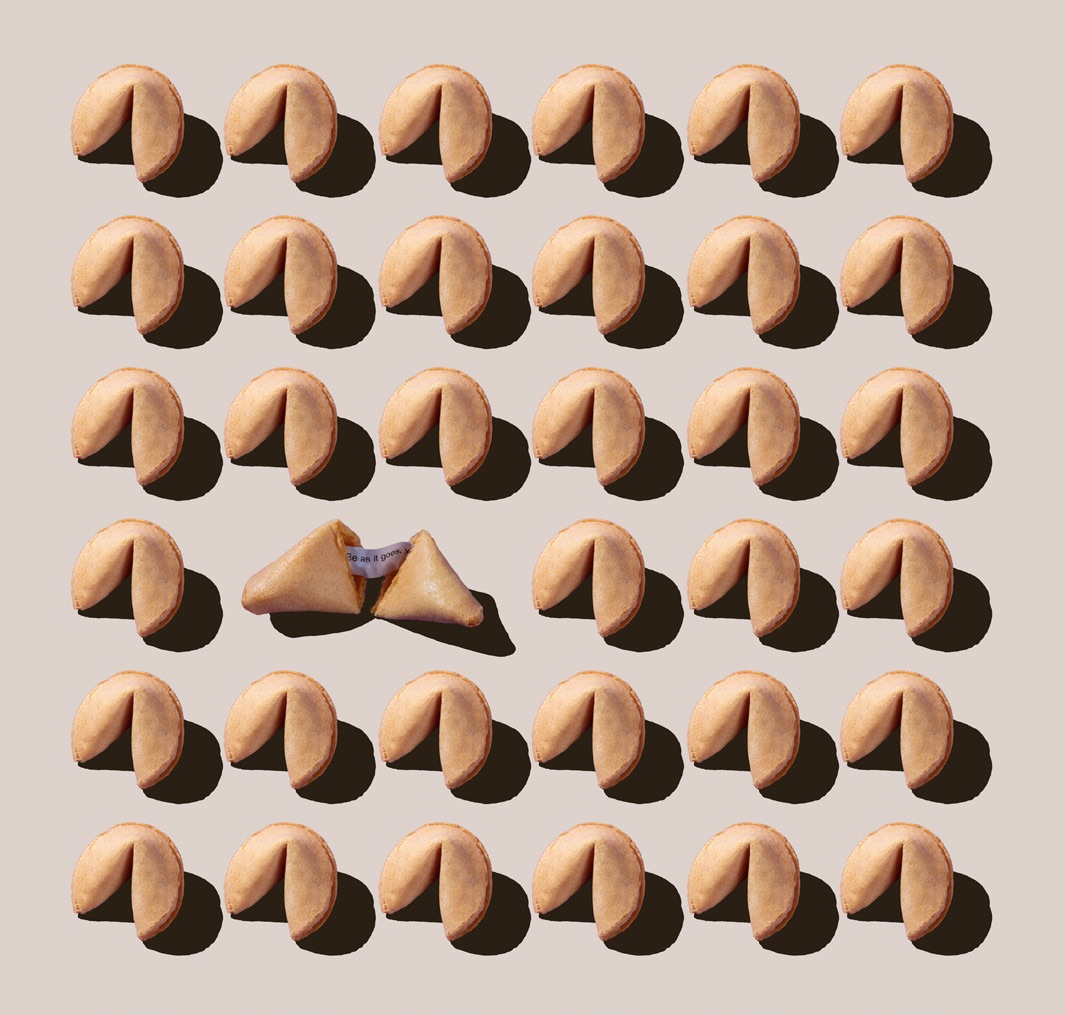Fortune cookies: a sort of crystal ball made of sugar and carbohydrates. Barely able to predict the future, yet highly capable of filling us with optimism - especially when we find inside this cookie exactly what we want to read. But what is the story with fortune cookies anyway? And where does this urge to want to know what the future holds come from?
Fortune cookies: a sort of crystal ball made of sugar and carbohydrates. Barely able to predict the future, yet highly capable of filling us with optimism - especially when we find inside this cookie exactly what we want to read. But what is the story with fortune cookies anyway? And where does this urge to want to know what the future holds come from?

Fortune cookies have become an indispensable treat in Chinese restaurants, especially in the United States, and are usually served with the bill. It is difficult to pinpoint with absolute accuracy their origin, as there are several stories about the subject. However, there is one fact we know for sure: these cookies actually have Japanese roots, and not Chinese, as many of us thought. It is likely that the predecessor of fortune cookies was the "tsujiura senbei", found in confectioneries near Kyoto, Japan, around 1870. This cookie was larger and darker than the current one, and, as far as we know, was made with sesame and miso. The message, however, was placed in the center of the cookie and not inside, as it is today.
Fortune cookies were brought to the United States by Japanese immigrants who moved to Hawaii and California after the Chinese Exclusion Act - as the US was still looking for cheap labor after the expulsion of Chinese workers. Thus, some Japanese bakers settled in cities like Los Angeles and San Francisco where, among various recipes, they also made these cookies. One of the most quoted stories mentions the Tea Garden in San Francisco's Golden Gate Park as the first American restaurant to serve this cookie. They obtained it from a local bakery, Benkyodo, which claims to have been the first to use vanilla flavoring and butter in the recipe, and also invented a machine for mass production.
One question remains: if this dessert is Japanese, how did it become so popular in Chinese restaurants? First of all, a fun fact: at that time, Americans did not want to eat raw fish (who knew...), so workers started to open Chinese restaurants, which were much more appreciated. Now, not so fun fact: during World War II, after the Japanese had bombed Pearl Harbor, President Franklin D. Roosevelt issued the famous Executive Order 9066 - an order that intended to remove all persons considered a threat to national security by allocating them within the country. Some time later, more than one hundred thousand people of Japanese descent were transferred to concentration camps. Thus, the bakeries of Japanese Americans closed, and Chinese American businessmen saw this event as a business opportunity. Shocking? Very much so.
Today, fortune cookies are still a phenomenon, but when we learn their true history, the magic associated with these cookies fades a bit... it is hard to ignore this duality: the same cookies that are a symbol of stereotypes and prejudices are also a source of entertainment and, for many, represent a dose of optimism, a moment of sharing, and, of course, an emblem of pop culture.
This theme also leads us to reflect on our need to know what the future holds for us. We look for answers in every possible way, even to the point of trying to find them in absolutely abstract messages contained in cookies, but we rely on them to give us a small dose of hope.
As human beings, we have an innate desire to know what lies ahead, so that we can prepare ourselves for the future. From an evolutionary perspective, predictions (even the most elementary ones) allowed our ancestors to take precautions and thus increase their probability of survival. For example, the better they knew how to anticipate the movements of animals, the better prepared they would be to hunt or to escape danger. But today our fascination with the future seems to be mostly caused by psychological and spiritual factors. Whether we really want to obtain practical guidance or just know what lies ahead, this curiosity is an integral part of the human experience. It is a desire rooted in our deep need for understanding and control. The future is the place where hope resides, but also fear, and like our ancestors, the better we know how to predict it, the more prepared we will be to face its adversities.
In essence, it is like starting to read the last chapter of a book, or looking for movie spoilers on the Internet: it may spoil the surprise a bit, but at least we can relax because we already know how it is going to end - and maybe, we can take responsibility for our actions because, after all, it was written in the stars. But that is a topic for another time.
That being said, and by way of conclusion, I had to do what anyone would do: I went and opened a fortune cookie:"New love or a passing fling on an upcoming trip." Uh! Lucky me!
Translated from the To be Continued on "The Lucky Issue" of Vogue Portugal, published March2023.Versão portuguesa, aqui.
Source: https://www.history.com/news/fortune-cookies-invented-chinese-japanese
Most popular
.jpg)

.png)
Relacionados


.jpg)

Sapatos de noiva confortáveis e elegantes: eis os modelos a ter em conta nesta primavera/verão
24 Apr 2025

